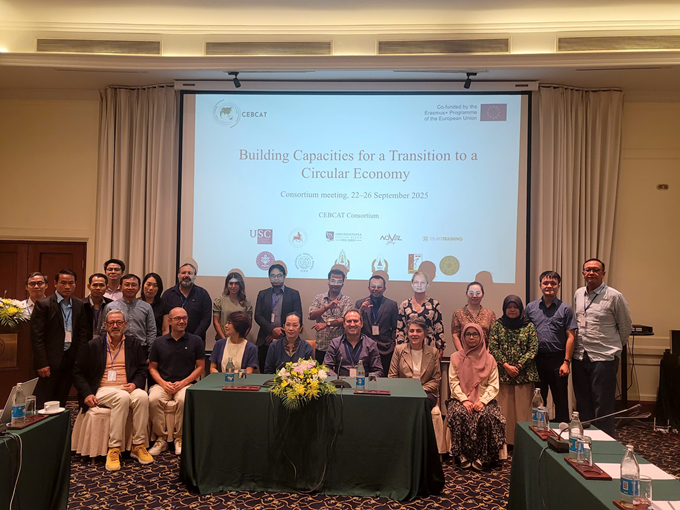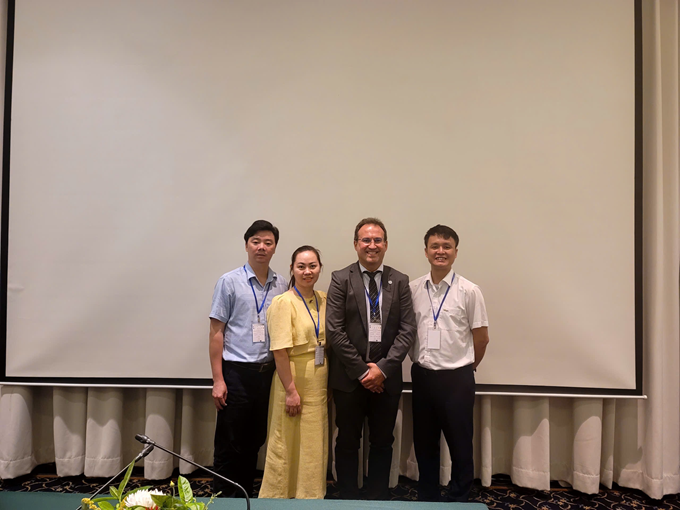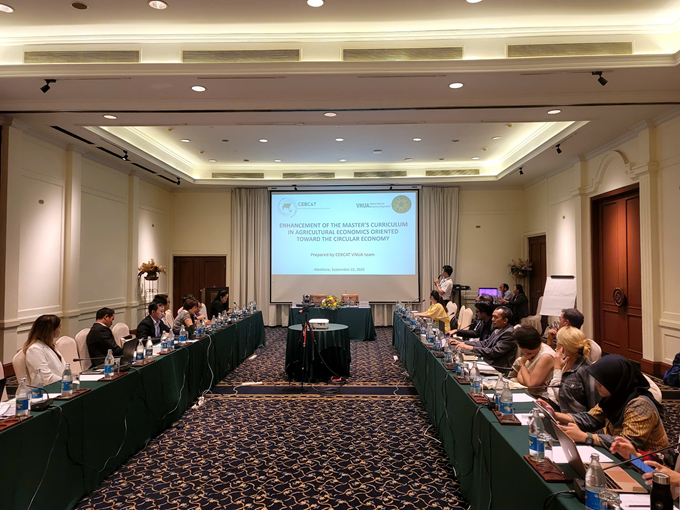The project “Capacity Building for the Transition to a Circular Economy” (CEBCAT) was funded by the European Union and coordinated by the University of Santiago de Compostela (Spain).
From September 22 to September 26, 2025, a delegation from Vietnam National University of Agriculture (VNUA) participated in the CEBCAT Capacity Building Study Visit in Vientiane, Laos. The event brought together international universities such as the University of Santiago de Compostela (Spain), the University of Thessaly (Greece), and several European universities and research institutes. In Southeast Asia, CEBCAT engaged six universities from three countries, including VNUA and Hanoi University of Science and Technology (Vietnam), the National University of Laos and Savannakhet University (Laos), and Sebelas Maret University and Bogor Agricultural University – IPB (Indonesia). This cooperation strengthened academic linkages, promoted international experience sharing, and enhanced the capacity for transitioning to a circular economy in higher education across the region.
The CEBCAT project focused on five main objectives: (i) improving the quality of higher education in the fields of circular economy and sustainable development in Laos, Vietnam, and Indonesia; (ii) developing advanced training programs on environmental analysis and sustainable energy transition; (iii) enhancing innovation capacity and effective environmental impact analysis; (iv) gradually standardizing curricula to meet international benchmarks; and (v) promoting academic cooperation and cultural exchange, contributing to the development of high-quality postgraduate programs. Within the project framework, the Faculty of Economics and Management, VNUA, focused on revising its Master’s program in Agricultural Economics to incorporate circular economy principles, drawing upon the European standard curriculum in Circular Economy.
    |
 |
| Delegates attending the study visit at the National University of Laos. |
During the five-day program (from September 22 to September 26, 2025), experts reviewed the project’s progress. Representatives of component teams from each country reported on their implementation status and initial outcomes. Overall evaluations confirmed that the project was progressing on schedule, achieving positive and goal-aligned results. Experts also discussed potential adjustments to enhance effectiveness in subsequent phases.
During the study visit, the delegation focused on discussing key theoretical issues related to ecosystems, energy and material cycles, as well as both theoretical and practical aspects of the circular economy. The main topics included the necessity of transitioning to a circular economy, application strategies, economic transformation models, and the barriers and challenges to the implementation. In addition, international experts shared experiences from advanced countries such as Greece and the European Union, while also presenting research findings on the transition to circular economy models in Asian and Southeast Asian countries.
The key emphasis of this study visit was placed on the implemention of project activities related to the design and improvement of training programs aligned with the circular economy, with immediate focus on a master’s program in Circular Economy. Experts from Laos, Indonesia, and Vietnam presented proposals on program structure, training contents, teaching methodologies, support tools, and evaluation criteria to ensure program quality in this field.
During the working sessions, the project coordinator from VNUA, together with representatives of the specialist team from the Faculty of Economics and Management, presented a progress report on the implementation and initial results within their assigned responsibilities. The report emphasized the integration of current regulations of the Ministry of Education and Training, analysis of the needs of learners and stakeholders, and alignment with the project’s overall objectives. On this basis, the Faculty of Economics and Management, VNUA, proposed and discussed with national and international experts the development of a Master’s program in Agricultural Economics oriented toward the circular economy. The program was being designed, revised, and refined to meet development trends, practical demands, and Vietnamese regulations, with the aim of establishing an advanced master’s program that would contribute to providing high-quality human resources for sustainable development.
    |
 |
| The delegation from VNUA take a photo with the chief coordinator of the project. |
As part of the study visit, international experts were provided by the National University of Laos with an overview of the country’s agricultural and rural development, with a particular focus on diversification and sustainable development. The report highlighted notable achievements while also identifying valuable practical lessons. In addition to academic activities, the delegation had the opportunity to explore the cultural characteristics of Vientiane in particular and Laos as a whole, thereby fostering greater mutual understanding and cultural exchange among the countries participating in the project.
In addition, international experts were also introduced to the country’s agricultural and rural development strategies, with emphasis on diversification and sustainability by the National University of Laos. The presentation summarized major achievements and offered practical lessons. Beyond academic activities, the delegation also explored the cultural heritage of Vientiane and Laos, strengthening cross-cultural understanding among participating countries.
    |
 |
| Dr. Luu Van Duy, representative of the specialist team from the Faculty of Economics and Management, VNUA, presents the progress report. |
The study visit in the Lao People's Democratic Republic has ended successfully. After five working days with many discussions, sharing and academic exchanges, at the closing session, the main coordinator of the CEBCAT project, Mr. Oscar Rodil Marzabal, acknowledged and highly appreciated the implementation progress, affirming that the activities had been carried out as planned and achieved initial positive results. In addition, some comments and adjustments were also agreed upon for the partners to continue to improve in the next phase. The conference also reached a consensus to organize a working program at VNUA in April 2026.